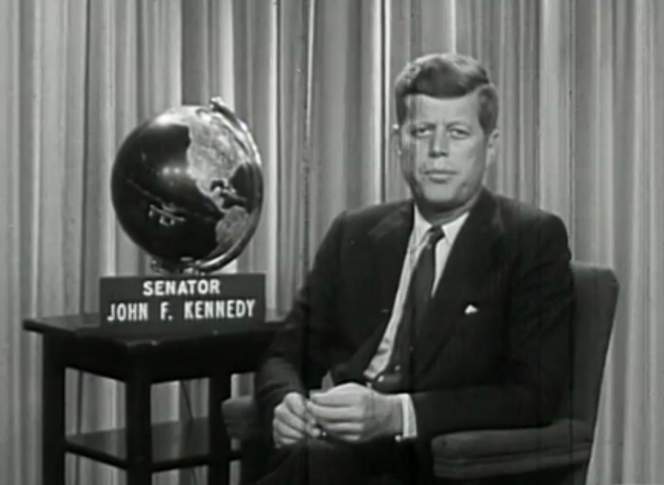JFK Makes His Pitch In Wisconsin's 1960 Primary
When John F. Kennedy was making his ultimately successful pitch for the Democratic Party nomination in 1960, Wisconsin's April 5 primary was considered early. New Hampshire's was first, but candidates treated Wisconsin's as the first significant showdown.
May 25, 2016

JFK Wisconsin TV spot

Wisconsin is 32nd in line for 2016’s presidential primaries and caucuses, but it wasn’t always a late-contest state. Wisconsin famously adopted an open presidential primary in 1912, and most other states took decades to catch up with open or closed primaries — or caucuses — of their own. And of course, the epic length of primary season, with its deluge of ever-shifting debates, polls and predictions, really only began to develop in the 1970s in the wake of Democratic Party reforms championed by George McGovern.
When John F. Kennedy was making his ultimately successful pitch for the Democratic Party nomination in 1960, Wisconsin’s April 5 primary was considered early. New Hampshire’s was first, but candidates treated Wisconsin’s as the first significant showdown.
The Massachusetts senator’s main rivals were Lyndon B. Johnson — the Texas senator who was quite prominent as that chamber’s majority leader and who, in fact, sat out the primaries — and U.S. Sen. Hubert H. Humphrey of Minnesota, who was well-liked among neighboring Wisconsin’s farmers and unionized workers. It was as a relative newcomer to Wisconsin voters, then, that Kennedy introduced himself in a short clip for WHA-TV.
If this appearance is dry by today’s standards, it still makes a savvy appeal to Wisconsin’s sense of itself as a laboratory of progressivism.
“The Wisconsin primary has had a great tradition,” Kennedy says early in the spot, “stretching back to the days of Governor La Follette in 1905, who helped design this law in order to permit the people of this state, as well as the people of other states, to participate in the selection of their presidential nominee.”
Kennedy and his campaign hoped a primary victory in Wisconsin would overcome the Democratic Party’s trepidation about nominating a Catholic in the face of lingering anti-Catholic bigotry in the United States. While Kennedy beat Humphrey with 56.5 percent of the vote, voters were split along religious lines in Wisconsin, where 40 percent of residents were Catholic. Historians and political commentators now generally regard the May 10 West Virginia primary as a more decisive step in making JFK the first Catholic president. At the time, 4 percent of West Virginia’s electorate identified as Catholic.
Still, Kennedy’s primary campaign in Wisconsin helped shape contemporary campaign strategy. As National Public Radio noted in 2013, JFK overcame Humphrey’s name recognition by drawing on Kennedy family resources to hire pollsters and run TV ads. Kennedy’s campaign also gave filmmaker Robert Drew unprecedented access during the Wisconsin effort, resulting in Primary, which is considered an influential work among political documentaries. And while Kennedy’s campaign wasn’t the first to commission its own polls, the practice was less common before 1960 but has been de rigeur ever since. In the general election, Kennedy would go on to take advantage of television as a medium during debates with GOP nominee Richard Nixon.
Wisconsin didn’t ultimately make or break JFK in the primary or the general election. Nixon would go on to win the state by about 64,000 votes. But in 1960, the state played an important role in national conversations about changing attitudes toward religion and transforming political perceptions.
 Passport
Passport











Follow Us